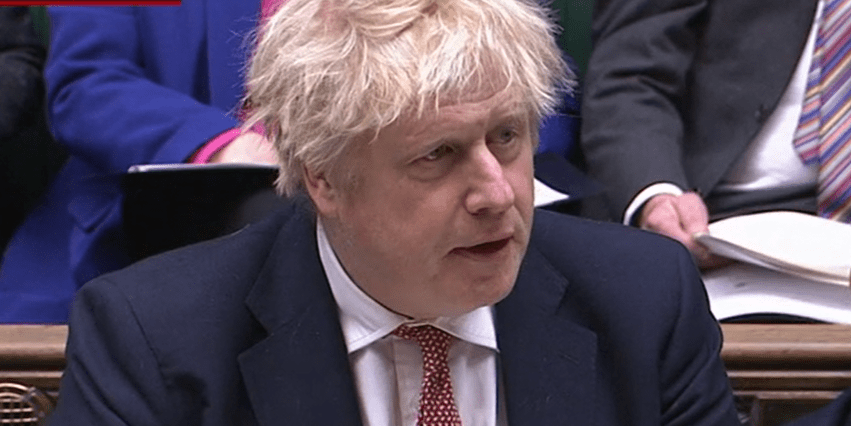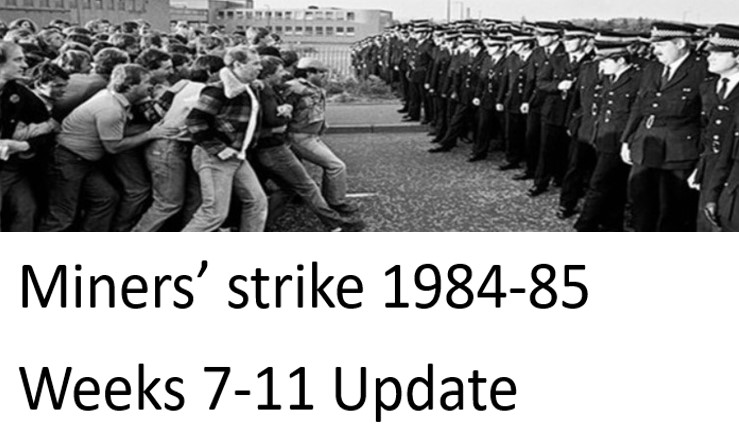Most workers would have welcomed the news that Boris Johnson is leaving parliament with a loud, “good riddance!”. His departure, like his whole time in office, was characterised by lies, swagger and bluster. But it would be a mistake to write his political obituary too early.
Johnson has never had more than a passing acquaintance with the truth and the House of Commons Privileges Committee – with a Tory majority – was about to report chapter and verse on his blatant lying to the Commons and to the British population about the partying in Downing Street during the Covid lockdown. The game was up.
The Committee would show while thousands of people were unable to visit loved-ones in hospital, or elderly relatives in care homes, attend weddings or funerals, that at the centre of government, and around Johnson personally, there was a ‘bring your own bottle’ party atmosphere. Moreover, he repeatedly lied in parliament about it.
Rather than face the publication of the Committee report as a sitting MP, with a possibility of a forced by-election, Johnson walked away. He has always had an overweening personal ambition and by resigning, he has dodged the likely humiliation of a by-election defeat, whilst leaving open the possibility of a comeback on his own terms.
In what is clearly a planned exit, two of Johnson’s closest parliamentary allies, Nadine Dorries and Nigel Adams, have also resigned their seats with immediate effect. It is rumoured that more may follow. Adams and Dorries have large majorities, both over 20,000, but not so far out of sight that Labour couldn’t win them, as the Lib-Dems overturned a similarly large Tory majority in Tiverton and Honiton almost exactly a year ago. That is a price Johnson and his allies are prepared to pay to keep their own flag flying. Indeed, three by-election defeats, undermining Sunak’s hold on office, may be a part of Johnson’s calculation.
Profound crisis in the Conservative Party
A lot of the commentary about Johnson’s resignation has focused on his personal traits. But we need to understand that his premiership and his resignation are both, in different ways, indicative of a profound crisis in the modern Conservative Party, a party that has been the main political representative of the British capitalist class for two hundred years and historically the most successful conservative party in Europe.
Nowadays, rather than the ‘natural party of government’ being a guarantor of economic stability and social peace, we have the interlinking of political, economic and social crises. We have had four Tory prime ministers in four years and, in Brexit, the greatest ever self-inflicted economic injury in peace time.
On current trends, the British economy is the worst-performing of the G7 countries – the major countries of capitalism – and the prospect that faces the big majority if the population is a never-ending squeeze on living standards, a decline of health, education and social services, and greater insecurity than has been faced by any post-war generation. The lives of millions are blighted by uncertainty, brought on by the looming catastrophe of British capitalism.

Just as Johnson being elected as Tory Party leader in the first place reflected this economic and social crisis refracted through the lens the Tory Party, so the same can be said of his resignation. It is indicative of a party racked by crisis.
Johnson’s honours list is only par for the course
It goes without saying that his resignation honours list speaks volumes about Johnson’s corruption and political methods. The honours include:
- Knighthoods or damehoods for his strongest supporters in Parliament: people like Jacob Rees-Mogg and Priti Patel.
- A peerage for the Tory mayor of Tees Valley, who is facing accusations of dodgy dealings over the regeneration of land formerly occupied by Teesside steelworks.
- His former principal private secretary Martin (“Party Marty”) Reynolds, organiser of a lockdown party in Downing Street and forced to resign for it, becomes a Companion of the Bath.
- His former chief of staff, Dan Rosenfield, who also left under a cloud with the partygate scandal, gets a peerage.
- Ben Elliot, former Tory co-chair, who mixed his personal business interests with fundraising duties for the party, got a knighthood.
- Johnson’s hairdresser – who even knew he used one? – got an OBE.
Johnson was denied the knighthood he wanted for his father, Stanley Johnson – that was a step too far even for the vetting committee – and the peerage he promised his supporter Nadine Dorries.
But as disgraceful as these ‘honours’ are – they represent a system that has no place whatsoever in any ‘democracy’ – they are little better than the ‘norm’ for resigning prime ministers. His total of seven peerages and 38 other honours compares with David Cameron’s thirteen peerages and 46 honours and Theresa May’s eight and 41. Cameron, like Johnson, gave an honour to his hairdresser. The whole honours system stinks: it is a racket, designed to reward overwhelmingly the scions of the Establishment – the greater shame being that ‘Labour’ leaders regularly participate in the charade.
A compulsive liar, blusterer, political opportunist, and chancer.
The only reason that Tory MPs chose to ditch Johnson last year was because he was becoming too much of a political liability as more and more revelations about Covid lockdown parties came out. But in terms of political outlook, there is little to distinguish most Tory MPs from Boris Johnson.
In the past, the Tory Party was always at pains to project a public image of honesty and propriety, not least because they were watched by the ‘great unwashed,’ the millionswho had a vote in general elections. They were by their own lights, ‘honourable’ men and women (although mostly men) who had ‘standards’ and who would resign on important matters of principle.
In comparison to their predecessors, today’s breed of Tory MPs, and Prime Ministers, are upstarts, without ‘honour’, honesty, or shame. Ministers are branded as bullies and liars, even by official inquiries, but they just brazen it out. Tory MPs and peers have openly fiddled on the Covid ‘gravy train’ to award contracts worth hundreds of millions of pounds to their friends and associates.
They are motivated only by their own personal greed and the interests of the business lobbyists who wine and dine them. They display no long-term consideration for their own party, the economy, or the country as a whole. No one better represents this new breed of Tory politicians than ‘Boorish’ Johnson, a compulsive liar, blusterer, political opportunist, and chancer, a man who only championed Brexit because it fitted in with his personal ambitions.
There are deep fault lines within the Tory Party, and they point to a possible major split in the longer term. A section of the Tory Party might be relieved to see Johnson gone and the possible loss of three seats in by-elections is for them a price worth paying to rid themselves of a troublesome maverick.
Johnson and allies are regrouping for the future
But unfortunately for them, the maverick may not have gone away for good. It is far too soon to write Johnson’s political obituary. In his resignation letter, amid all the petulance and Trumpish narcissism, he made it clear that he was leaving parliament “for now”. Like his friend Trump, he claims – and his acolytes go along with the idea – that he was “cheated” and not “fairly” beaten. It looks very much like he and his supporters are going to regroup for the future.

Accepting that the Tories will lose the next general election, the Johnson cabal are already calculating how to deal with the aftermath. According to the Financial Times, there is even speculation that the seat of Nadine Dorries, if it is lost in a by-election, could be won back (as by-election seats often are) in a general election.
And who better to be selected in Dorries’ former seat of Mid-Bedfordshire, and then to win it back for the Tories in 2024, than Boris Johnson? “The idea of Boris moving to Nadine’s seat is absolutely what people are talking about — 100 per cent,” one Tory official told the Financial Times.
It is for that reason that some Tories and Sunak loyalists have called for Johnson to be banned from standing as a Conservative candidate. “Johnson’s angry resignation and threat of a return” Michael Heseltine wrote in the Observer, “have all the characteristics of a disaster turned into an opportunity” (June 6). Another senior Tory figure told the Guardian, “The pantomime has to end. He has to be stopped by whatever means and the sooner the better”.
The turbulence and unpredictability of modern politics
If that were to happen, we would have the astonishing situation – itself an indication the turbulence and unpredictability of modern politics – that both of the main party leaders who fought the last general election would have been banned from standing again as candidates by their own parties.
Having been rewarded by his friend with a knighthood, Jacob Rees-Mogg has returned the favour by warning of a “civil war” in the Tory Party, if Johnson was banned. In fact, whether Johnson is allowed to return to parliament in the short term or not, his resignation is an indication of the inevitable looming internecine conflict among Tories.
If the Tories lose the next general election – and the polls suggest that is likely – then the knives will be out for Sunak. There are already a number of Tory MPs who see Johnson as the ‘charismatic’ leader they need, and he remains popular among Tory Party members.
To be sure, his personal ambition will clash with others around Sunak who are no less ambitious – people like Suella Braverman, Kemi Badenoch and Jeremy Hunt – but Johnson could form the core of a new and larger right-wing faction in the Tory Party, in the same way that Trump has effectively captured a large part of the Republican right in the USA.
Despite the appallingly bad leadership of Keir Starmer, and his relentless shift to the right, Labour has been boosted in opinion polls by this latest stunt of Johnson’s. The lack of any socialist ideas and Starmer’s piecemeal abandonment of any policies even remotely radical mean he will also be swamped by a system in crisis.
That is not understood, however, by millions of voters who desperately seek an alternative to Tory government. Starmer has called for a general election and the big majority of workers would indeed be glad of an opportunity to see the back of the Tories. The sooner it happens the better.



